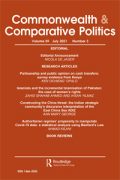Published in 2011, this article argues that the management of ethno-national conflict remains an important issue on the security agendas of states and international organisations alike, from the Western Balkans to the Middle East and Asia Pacific, from sub-Saharan Africa to Central Asia and the Far East. The practical need to manage ethno-national conflict has also resulted in thorough academic engagement with the subject, which has generated a range of different theories of conflict management.
The article provides an overview of the current debate and examines the differences and similarities between three different theories – liberal consociationalism, centripetalism, and power-dividing. Based on this examination, an analytical framework is developed to identify the conditions under which ethno-national conflict management can succeed in providing settlements in the framework of which sustainable peace is attainable.

